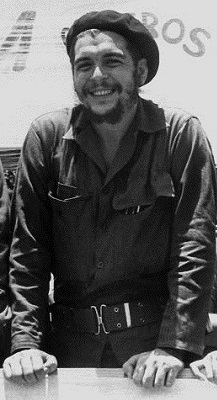|
~ Ernesto Che Guevara
~ Galéria
~ Oldal
~ Bejelentkezés
~ Vissza a Főoldalra
Ernesto Che Guevara, az argentin származású forradalmár, miniszter, gerillavezér és író, Buenos Aires-ben szerzett orvosi diplomát, majd a kubai forradalom során jelentős szerepet játszott a szigetország felszabadításában és újjáépítésében. A kubai gazdaság talpraállításáért dolgozott, küzdött az oktatás és az egészségügy fejlesztéséért, az írástudatlanság és a faji előítéletek felszámolásáért. Saját példájával népszerűsítette az önkéntes munkát. Kongóban és Bolíviában is harcolt - harminckilenc éves volt, amikor az amerikai-bolíviai csapatok csapdába ejtették és kivégezték.
| | |
|

| | |
|
|
|
Cuba Celebrates 53 Years of Socialist Nature of Its Revolution
|
|
|
Havana, Apr 16 (Prensa Latina) Cuba is updating its economic and social model, but it maintains the socialist nature of its Revolution, proclaimed on April 16, 1961.In order to achieve that goal, measures have been taken, including new forms of production such as self-employment and cooperatives, among other actions aimed at building a prosperous and sustainable socialism.
The historic leader of the Cuban Revolution, Fidel Castro, noted that "this is the socialist and democratic Revolution of the humble, by the humble and for the humble".
"And for this Revolution of the humble, by the humble and for the humble, we are willing to give life," he stressed on April 16, 1961, before a crowd of passionate Cubans who accompanied the victims of mercenary bombings perpetrated the day before.
On Saturday, April 15, enemy planes camouflaged with the insignias of the Revolutionary Armed Forces bombed the airport at Ciudad Libertad (in the capital), the air base in San Antonio de los Baños (southeast of Havana) and the airport in the eastern city of Santiago de Cuba.
According to history, the people gathered at the corner of 23rd Avenue and 12th Street, near Colon Cemetery. Cuban flags were hanging from the balconies and flowers were falling.
The funeral procession and the march of thousands of people stopped at the since then historic corner of 23rd and 12th, where Fidel Castro gave a speech.
In allusion to Washington, the Cuban leader said, "This is what they cannot forgive us, that we are here, under their noses, and that we have made a socialist Revolution under the own noses of the United States."
That way, the Cuban Revolution was announcing to the world, and Washington, its socialist nature.
Fidel Castro then accused the U.S. administration of hindering the peaceful march of the Cuban nation, destroying its people's economic resources and their citizens' lives, and demanded that the United States took responsibility for the aggression.
These events will teach us, these painful events will illustrate us and will show us, perhaps more clearly than any others that have occurred until today, what imperialism is like, he stressed.
The image of rifles raised by men and women immortalized the total support for the turn that the revolutionary process would take from then on and that it still continues in Cuba.
In that speech, Fidel Castro also foresaw the aggression that was being organized and that was perpetrated two days later in Playa Giron (Bay of Pigs).
In less than 72 hours, the recently-created National Revolutionary Militias, along with forces from the Rebel Army and the Police, defeated the invaders and that victory is considered the first defeat of the United States in Latin America.
Source
|
|
|


| | |
|
|
|
~ Ernesto Che Guevara
~ Gallery
~ Site
~ Log in
~ Back to the Main page
Ernesto Che Guevara, the Argentine-born revolutionary, minister, guerrilla leader and writer, received his medical degree in Buenos Aires, then played an essential part in the Cuban Revolution in liberating and rebuilding the country. He did his best to set up the Cuban economy, fought for the improvement of the education and the health system, the elimination of illiteracy and racial prejudice. He promoted voluntary work by his own example. He fought in the Congo and in Bolivia - he was thirty-nine years old, when he was trapped and executed by the joint American-Bolivian forces.
| | |
|
|

